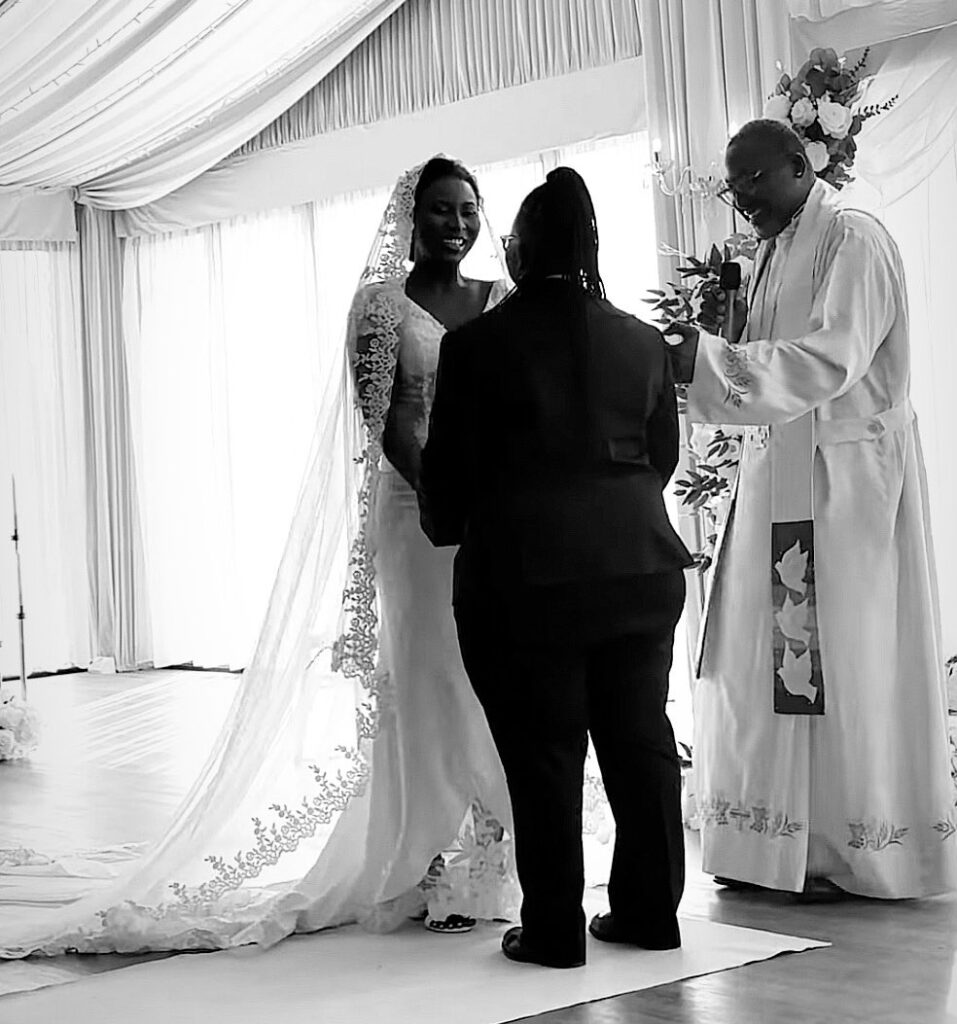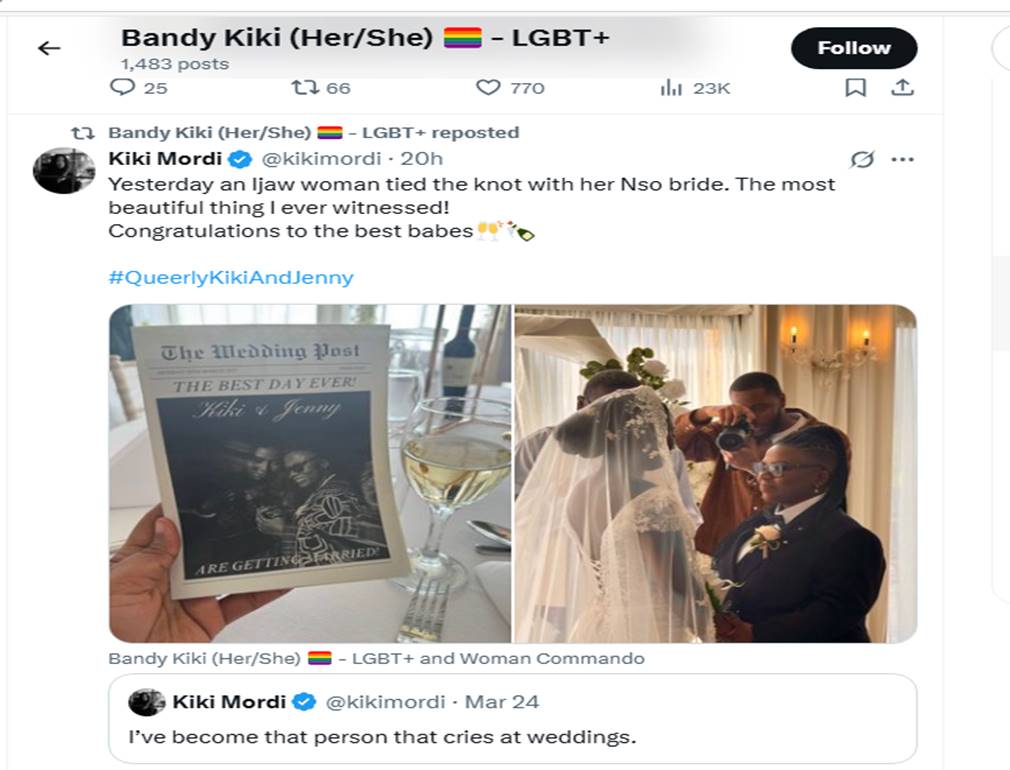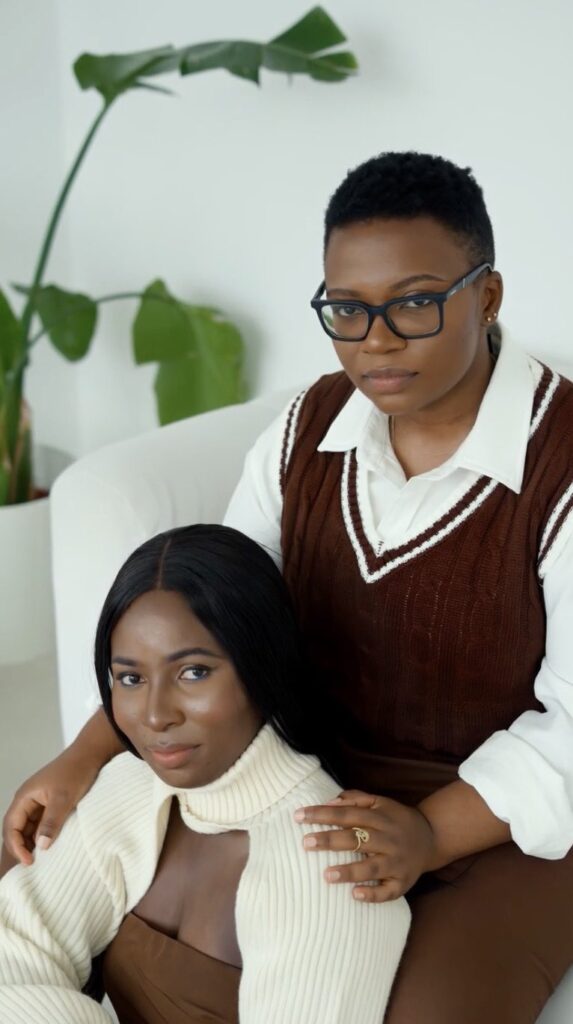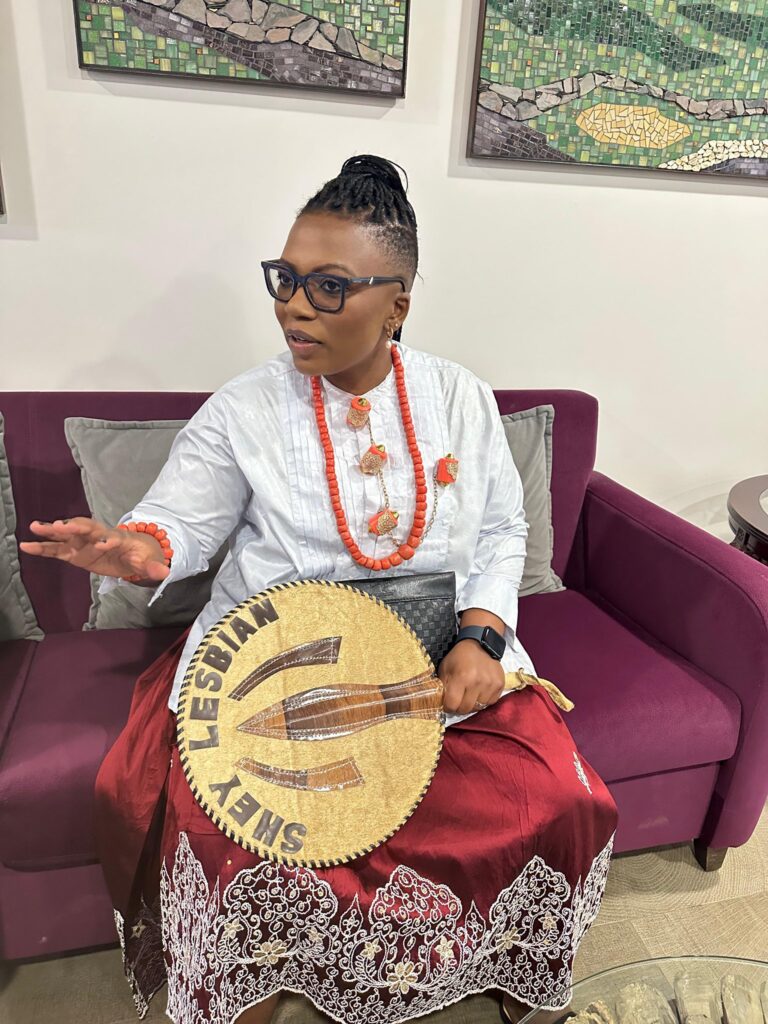March 26, 2025 – Nigeria
In a milestone in both her own life and in the history of the world LGBTQ+ community, Cameroonian activist Bandy Kiki, based in the United Kingdom, has married her Nigerian fiancée, Jenny. The announcement of marriage on March 25, 2025, is a defining moment in the life of Kiki, as also in the process of activism and self-discovery.

Kiki, who openly declared herself gay in 2017, commemorated the joyous occasion through an Instagram post, which she titled, “Yesterday, I became Ijaw by marriage.” It is in a few words that not only did she declare her marriage to Jenny, but also embraced the native culture of Jenny’s Ijaw people, which resonates deep and loud within African identity and gay rights.
From Cameroon to the World: Kiki’s Journey as an LGBTQ+ Advocate
Cameroonian-born Bandy Kiki is one of the leading personalities of the LGBTQ+ community who speak out about the rights of LGBTQ+ individuals, particularly in Africa, where homosexuality remains a crime in most countries. The coming out of Bandy in 2017 was a momentous decision in light of the social and political context in her homeland, where LGBTQ+ individuals are often marginalized, assaulted, and persecuted according to the law.

Kiki’s activism extends beyond just fighting for acceptance of sexual and gender minorities. She has used her media presence, both in traditional and social media, to educate the public on issues ranging from HIV awareness to legal reform in Africa, where LGBTQ+ rights are routinely denied. Her work has been instrumental in providing a voice to those marginalized in her community and beyond.

Kiki’s journey has also involved a significant geographical shift. In pursuit of greater personal freedom and opportunities to expand her advocacy work, she relocated to the United Kingdom, where she found a larger and more open space to thrive. Despite living in a more accepting environment, Kiki’s heart and activism remain deeply tied to the African continent, where she has become a symbol of courage and resilience.
Read More Trending News
Goodluck Jonathan Awarded the 2025 Founder’s Sunhak Peace Prize
NYSC Corps Members to Receive N77,000 Allowee Backlogs – FG Reassures Corps Members
Her marriage to Jenny is both a personal victory and a victory of visibility and representation for queer African women whose lives are too often erased or marginalized by their own cultures as well as by the mainstream LGBTQ+ narrative.
A Love Story That Crosses Borders
While Kiki’s life is marked by her public advocacy, her relationship with Jenny has been largely private until now. Their bond has transcended not only borders but also the challenges of being a queer couple in regions where homosexuality is often seen as taboo.
Jenny, who hails from the Niger Delta region of Nigeria, is of Ijaw descent. The Ijaw are one of the biggest and most influential ethnic groups in Nigeria, particularly in the oil-bearing Niger Delta. The Ijaw have a vibrant cultural history and a diversified social fabric with strong emphasis on communal identity, religiosity, and tradition. For Kiki, Jenny’s culture has not only been a learning process but a means of experiencing the rich cultural heritage of Africa in a more personal way.

Ijaw customs and traditions are founded on a profound respect for nature and for society. Their wedding is not merely a union of two individuals; it is also a union of two worlds of culture. Kiki’s embracing of the Ijaw identity through marriage symbolizes a deeper connection with Jenny’s family, her heritage, and her people. In her Instagram post, Kiki alluded to becoming “Ijaw by marriage,” acknowledging the significance of their shared cultural heritage. In Ijaw communities, marriage is not just a personal commitment but a societal one, with strong ties to family, lineage, and ancestry.
The Cultural Significance of the Ijaw People
To understand the weight of Kiki’s statement, it is essential to explore the cultural significance of the Ijaw people. The Ijaw are indigenous to Nigeria’s Niger Delta, an area rich in oil resources but also fraught with environmental and political challenges. The Ijaw community, one of Nigeria’s oldest ethnic groups, has faced numerous struggles for autonomy and cultural preservation amid government neglect and corporate exploitation.
Read More Trending News
Goodluck Jonathan Awarded the 2025 Founder’s Sunhak Peace Prize
NYSC Corps Members to Receive N77,000 Allowee Backlogs – FG Reassures Corps Members
Ijaw society possesses a unique social structure, one where both the maternal and paternal sides come together in family life. Marriage among the Ijaw society is of two kinds: small dowry and big dowry marriages. Under a small dowry marriage, the bride’s kinmen take a small money payment from the husband, and children are followed through the matriline. In a large dowry marriage, the groom offers a substantial dowry, and the children inherit the father’s lineage. Kiki’s union with Jenny likely reflects a blend of these traditions, symbolizing a commitment that goes beyond the individual couple, intertwining them with the social fabric of the Ijaw community.
The Ijaw equally enjoy a passion for art, music, and dance, regularly applying these methods in order to pay tribute to cultural events as well as spiritual traditions. Jenny and Kiki’s wedding will definitely be understood to be an observance on both sides of their communities—of personal as well as social jubilation.
Kiki’s Decision to Marry: Symbol of Opposition and Welcoming
Kiki’s marriage to Jenny comes at a time when LGBTQ+ rights are still a contentious issue in many African countries. In some nations, such as Uganda and Nigeria, homosexuality is criminalized, and LGBTQ+ people are subject to harassment, imprisonment, and sometimes even violence. In Cameroon, the country where Kiki was born, same-sex relationships are illegal, and LGBTQ+ people can face years in prison if caught engaging in same-sex acts.
Despite the risk of backlash and public condemnation, Kiki has never been afraid to be herself. Her marriage to Jenny is a rebellious rejection of laws and attitudes that seek to silence and suppress LGBTQ+ individuals in Africa. By being so open about her love story, Kiki is demanding that love, in whatever form, should not be confined by borders, law, or cultural definitions.
Read More Trending News
Goodluck Jonathan Awarded the 2025 Founder’s Sunhak Peace Prize
NYSC Corps Members to Receive N77,000 Allowee Backlogs – FG Reassures Corps Members
Her marriage to Jenny also highlights the complexities of being a queer African woman. LGBTQ+ rights in Africa are often discussed in terms of Western influence versus traditional African values, a narrative that pits homosexuality against cultural identity. However, Kiki’s embrace of both her African heritage and her LGBTQ+ identity offers a different perspective—one where love and culture can coexist, and where acceptance and inclusion are integral to both personal and societal transformation.
Celebrating Intersectionality: Kiki’s Impact on African LGBTQ+ Advocacy
Kiki’s marriage to Jenny also underscores the intersectionality of her activism. As a queer Cameroonian woman, Kiki’s advocacy extends beyond the LGBTQ+ community to include broader issues of gender equality, women’s rights, and racial justice. Her visibility as both a media personality and an LGBTQ+ activist provides a powerful platform for addressing the multifaceted issues faced by marginalized individuals in Africa.
Her activism is based on the reality that LGBTQ+ rights aren’t just about sexual orientation but also about giving dignity, love, and freedom to everybody, independent of gender, race, or ethnicity. By marrying Jenny, Kiki makes a bolder declaration that the fight for LGBTQ+ rights is a fight for human rights, a fight that transcends borders and barriers, a fight for a future where everybody can just be who they are and live free from fear.
A New Chapter in Love and Advocacy
For Jenny and Kiki, their marriage is not merely a private promise but a greater statement of love, identity, and cultural respect. It’s a call for greater inclusivity in the LGBTQ+ movement, which has traditionally been dominated by Western voices. Theirs is a demonstration of how diverse and far-reaching the LGBTQ+ community actually is, and how its struggles intersect with those of other oppressed communities.
As Kiki practices her advocacy, her marriage to Jenny will likely inspire many across the African continent and indeed the world in general, as a beacon of hope for the LGBTQ+ population who feel othered or erased. Theirs is a demonstration of the power of love, the power of resilience, and the conviction that sexual identity and cultural heritage may be in concordant existence.
Read More Trending News
Goodluck Jonathan Awarded the 2025 Founder’s Sunhak Peace Prize
NYSC Corps Members to Receive N77,000 Allowee Backlogs – FG Reassures Corps Members
This union is a moment to reflect on how far the LGBTQ+ rights movement has come in the past few decades, particularly on the continent of Africa, where sexuality has been a thorny issue. But it is also a reminder of just how far it still has to go. For most LGBTQ+ individuals, the path to complete acceptance continues to be fraught with challenges.
As Kiki and Jenny begin their new life, their story becomes one of inspiration to so many—proof that love really is stronger than borders, and that loving and embracing one’s culture and identity is a very powerful resistance against a world that all too often attempts to cleave.
What does GistNexus have to say on this “ Cultural Inclusion and LGBTQ+ Advocacy”?
As the world keeps changing, Bandy Kiki and Jenny’s marriage remains a testament to progress, to the comingling of love and heritage, and to the ability of LGBTQ+ activists to defy norms, not just in their own lives, but in the world at large. Their commitment to one another is not only a marriage of two individuals but also a unification of cultures that transcend borders, challenging local and international understanding of love and identity.
Through their story, Kiki and Jenny show us a world in which love, in all its forms, is accepted as an universal human right, without regard to nationality, gender, or sexuality.
GistNexus Wishes them Happy and Blessed Home
All the staff of GistNexus wishes them happy Home.
Read More Trending News
Goodluck Jonathan Awarded the 2025 Founder’s Sunhak Peace Prize
NYSC Corps Members to Receive N77,000 Allowee Backlogs – FG Reassures Corps Members

Reported by GistNexus Team and Edited by Mr. Chibueze Onwuka
